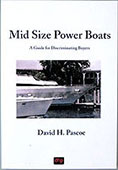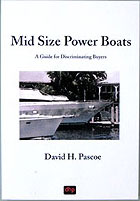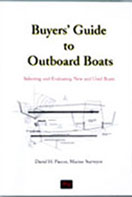Boat Buying 101a
Version 392.67
From the University of Boats and Computers
Toward a BhL
by David Pascoe
Yep, I used a little bit of trickery there with that title to get you here. After all, you already know there is no such thing as a perfect boat. My wife said that isn't a very professional thing to do on a business web site. I said that I was getting too old and the days were going by too fast and too much of business is conducted as stiff as a plank, so that if you spend your days stiff, you'll end them stiff. I mean in retirement, not the coffin. So it's time to loosen up. Enjoy some humor.
Okay, I confess: I'm as frustrated as many of you are. I get dozens of e-mails every week asking for help in making a decision on what boat to buy. This, despite the fact that this entire web site is the answer to your question.
Boating is a vast subject, but people want quick and easy answers. The only quick and easy answer is just go buy whatever looks good to you. Even on our laziest days, we know that's not a very good answer. So what to do? Well, let me see if I can't twist it around another way.
I'm going to use the analogy of the personal computer. it's a good one because PC's are hopelessly complex little machines (some call them devils) and I've never met anybody yet who knows everything about them. They are similar to boats in that the more you know about them, the more you realize how little you know. I've been tearing them apart and picking at the innards going on 17 years now and they seem more mysterious than ever. The bottom line for both is that unless you devote your life to the subject, you can never know them well enough. They can make you happy and miserable at the same time. But while people murder their spouses, rarely do they murder their boats or their computers. Ever hear of a boater flying into a rage with an axe on his boat? Cars maybe, but not boats.
Answer: Nobody. A computer is an amalgamated evolution of unrelated and incompatible parts assembled by child geniuses. Computers do a little bit of everything but nothing well. Or for very long.
I purchased my first PC in 1982, a Radio Shack Model 2. It had 16 k RAM and 4mb hard drive. Sixteen years later I am sitting here in an office surrounded by computer equipment that costs a fortune and takes up far too much of my time just keeping the whole bundle of chips and million lines of code working right. If I didn't enjoy playing around with these things, I would readily admit that they make my life not easier but far more difficult. Fifteen years ago I dictated my reports into a recorder and flipped a cassette to a secretary to type. Today, the annual salary of a secretary equals the cost of my machines, so at least I'm ahead in one regard. In others I'm way behind.
Now, I don't just do business on my machines. You see, I have this KISS sign up on my wall but I totally ignore it. That's because one of my hobbies is flying the latest jet fighter planes with air combat simulations, massive programs that even Intel has a hard time keeping up with. I ask my computers to do everything and stretch them, and myself, to the limits. And beyond. I want it all, and I have to be willing to pay for that, both in terms of money and my time. Time because there is no such thing as an off-the-shelf machine that will do what I want it to do. I have to make a lot of adaptations, using all this high tech stuff that I'm not really an expert at. Very often, even the experts can't help me because no two computers are alike once you start fiddling with the dang things. I spend more time with the guts than the glory of shooting down MiG 31's in stunning maneuvers of aerial combat. Editing .dat files is about as much fun as changing crankcase oil.
Boats and computers also have these similarities: There's no way to educate yourself without buying one. You have to jump in with both feet, hopelessly screw everything up, and start from there. Make lots of big, costly, time-consuming mistakes. Get bad advice. Buy the wrong one at least twice, probably three times. Throw cash out the window. Tear your hair out, if you still have any. Become an obsessed recluse, stay up all night and walk around half asleep by day. Have your wife threaten to divorce you, alienate your kids because you won't let them use it, and so on. After it's all done, you can go out on your boat and get rip-roaring drunk along with all the other drunks out there and a good time will be had by all. At least until the divorce papers arrive or you are called up out your cell for a bail hearing.
Or you could work 20 hours a day and get so rich in another obsession called career that you can afford to pay for anything. But then you'd have to spend all your time guarding your fortune because money truly has wings. Once you turn your back on it, it's gone. Just ask the casual investors with stock portfolios. So then you don't have time for playthings. Being poor costs money; being rich costs time. As some yahoo once said, "Neither don't get both." Strive for the happy medium. Philosopher at work here.
As with computers, boats once were the province of an elite. Yachts, they were called. For rich folks. Computers are for nerds and geeks. I guess we all know what those are. Anyway, both the computer people and the boat people wanted to sell more computers and boats. One attempted to make computers idiot proof with the under-$1,000-computer that you will have to throw away and buy a new one every year because the computer people are smarter than you are. Don't even give you a manual anymore because they don't expect you do anything with it. $1,000 bucks to get on the internet. Before Bill Gates owns it, that is. The Microscape Browser 2000.0 is free. They already know that next year's hottest programs are going to force you to buy a new one, but you don't. And when you screw it up, it's cheaper to buy a new one than to fix it.
On the other hand, the boat people can't make boats idiot proof, but they can so reduce quality and the price that lots of people will buy them. People who don't know any more about boats than they do computers. Make them look like Edsels and Buicks. And they're all in the same pickle. Boats and computers . . . . they are unlike most everything else you buy, except maybe a horse or an airplane. Economically speaking, none of these things have an OFF switch. Clock is always ticking.
Except that a boat is a couple hundred times larger than a computer and you can't just stuff it in the closet and forget about it. Much as we might like at times. Boats are like having a baby. They make constant demands on your time and wallet. I won't even mention labor pains. The finance company and the marina sometimes call to remind you of this unpleasantness. Or the miserable thing won't run because you didn't give it its midnight feeding of ugly green cash. The $800 computer reminds you by simply refusing to run that great new program you just bought. Or the kids got ahold of it and it's now requiem time. At least it can go in the closet. Nobody ever puts junk computers in the trash. (Magically, they will spring to life on Christmas Eve in the year 2082.)
Sooner or later we complete our lessons from the University of Boats and Computers and we hand ourselves a Baccalaureate of Hard Lessons, a BhL as it were. And move on to a new dimension of insanity. But what the heck! We are having fun, aren't we? Sure we are. After all, tuition at any university is expensive and the degree we just got looks like a bargain by comparison. 35 G's down the drain for that tub I bought? Heck, that kid of mine sucks up 12 a year easy. No big deal. Besides, the liquor cabinet holds litre bottles, not quarts.
Except that a lot of folks can neither afford the boat or the kid. But they got one or both. Better two boats than two kids though. Definitely cheaper. I promise I won't even mention wives.
Bottom line? Boats are not cheap pleasure, and are sometimes expensive misery. Never have been, never will be, no matter how cheap they make 'em. More people own them than should, but that's okay by me. Like our little computer, the cheaper they get, the more they cost, for the one you got isn't going to last, or just won't do. So there's always another, hopefully bigger, better, faster and gigabytes up the gazoo. By the time a lot of water passes under the bridge, we start to evaluate our economic priorities. Lots of bucks going out the door on stuff we've replaced all too frequently. Like those coffee pots and toasters I keep buying. Do you buy too many coffee pots and toasters? Why can't they make one that lasts more than a year and doesn't dribble burnt crumbs all over the place? Never mind feeding the six million ants that think it's a chrome plated McDonalds for insects.
The cost isn't much until you realize that you've bought a dozen of each over the years because the darn things ain't worth a diddly. How much would I have saved if I had just bought one good one, instead of a dozen junkers? My wife bought me one of those chi chi, noveaux-chick, new age, new wave, designer coffee makers that cost way too much. Like about ten of the el cheapos. She thought it looked like good quality and would last. I thought so too, but I was wrong. It did not work fresh out of the box. So much for price = quality. Now we're working on a Masters of Economic Priorities (MeP) with a minor in Munificient Materialism. From the Milton Friedman School of Economics. Problem is, uncle Milty is the original Mr. Pragmatism and he says unpleasant things that no one wants to hear. Like the stock market is this vast, inflated bubble and he can't wait to hear it go POP! And here I am with a bag of mutual funds with companies that do business in Asia. The end is in sight and there ain't never gonna be enough money in the world to waste a dime. More fun being profligate, but social security doesn't go far. I heard those stories about cat food diets too. Kinda makes one think a bit further than one would like.
Now that ole boat, it don't quite get as much use as it once did, but dang it, I still want to have one anyway. I just need one that's going to last a little longer, one that doesn't immediately look like last decade's edition of an Edsel or a Hudson. (Hey! Isn't that what Charlie's new Lincoln looks like? I mean a Hudson, a Hudson Hornet? All round and sort of turtle-looking.) And a boat that doesn't go roaming around my bank account like a crazed vacuum cleaner gone wild in the Denver mint. Does anybody make such a boat? Hmm, probably not, unless it's the government. Speaking of titanium, the cost of that stuff is out of sight. And definitely out reach. Still, engine blocks machined out that stuff would surely solve the corrosion problem with marine engines. They machine the F22 airframe out of a solid block of titanium. Guess that's why they cost $70 mil apiece. Even the taxpayers can't afford that little beauty. Shoot the socks off the Soviets though.
Let's buy a Bertram or Viking! Wait . . . . $685,000? . . . . Whoa, I could buy six junkers for that price. Toss them aside like used underwear and I'd still be ahead. So what can I afford?
I wish I could help with advice on what to buy. But there are 800 odd boat builders out there turning out some 56,000 different late model boats (there are that many in the BUC Used Boat Price Guide, 1991-1997 alone). I don't know 5% of them and haven't even heard of most. it's a big land out there and builders tend to be regional. Every one who asks has different ideas.
Everything I've put up on this site is enough to educate you to make your own intelligent decisions. If such a thing can be said for buying a boat. It will take you less time to read it all than it took me to write it, which was several years. Many, if not most of you, think that the reviews are there to tell you what to buy. No so. Read my introduction. The reviews are there to educate you about the differences between the good, the bad and the ugly. And why you can't get it all in one pot. The one that has it all is at the end of the rainbow. Not one of the reviews was put there as gratuitous criticism, despite my frequent sarcasm, which is there to get your attention, which it surely does. Had a professor taught that way once, and I can darn near remember everything he said. "Cotton, Corn and Tobacco! Two cents worse than syphilis," he would shout, waking those who needed waking, and cracking up those who didn't. Nobody dared ask him what the hell that meant, and to this day I don't. Apparently it had something to do with soil depletion, considering he was a Georgian.
There's another thing about computers and boats. If you try to learn too much, too fast, all you do is get confused. You add priority on top of requirements until the next thing you know is that the list is so long you don't seem to know anything. Too much learning too fast is not a good thing. That's called cramming and it gets you nowhere. Pass the test but flunk the course.
The important thing to keep in mind is that if you can't afford to make a big mistake, you shouldn't buy a boat. Neither should you buy a Hudson. At least scale down your appetite to the point where the mistake won't ruin your economic or home life if it all turns to smoke. There is no escape for novices and first time buyers. The entry level, be all, do everything perfect boat that doesn't crumble faster than you can pour money into it doesn't exist. Not any more than you can get a decent computer for $899.95. Plus taxes that don't have OFF switches either.
Get your feet wet, don't worry, be happy, have fun. You gotta lotta learning to do and it's all part of the thing we do called boating. It takes time. Essential to its practice is the element of economic dysfunctionalism. Boaters do not attend Uncle Milty's School. Never. Nobody in their right mind ever suggested that buying a boat is a sane way to spend money. Or that boaters are necessarily sane.
The learning part is free.
Posted October 22, 1998

















David Pascoe is a second generation marine surveyor in his family who began his surveying career at age 16 as an apprentice in 1965 as the era of wooden boats was drawing to a close.
Certified by the National Association of Marine Surveyors in 1972, he has conducted over 5,000 pre purchase surveys in addition to having conducted hundreds of boating accident investigations, including fires, sinkings, hull failures and machinery failure analysis.
Over forty years of knowledge and experience are brought to bear in following books. David Pascoe is the author of:
In addition to readers in the United States, boaters and boat industry professionals worldwide from nearly 80 countries have purchased David Pascoe's books, since introduction of his first book in 2001.
In 2012, David Pascoe has retired from marine surveying business at age 65.
On November 23rd, 2018, David Pascoe has passed away at age 71.
Biography - Long version